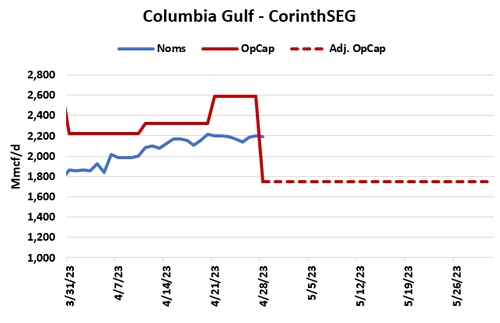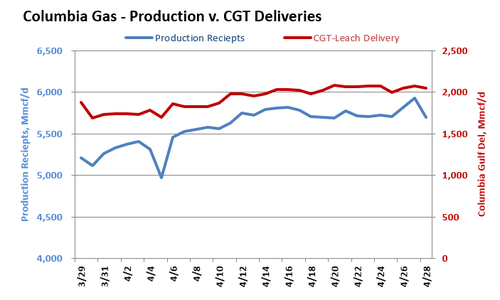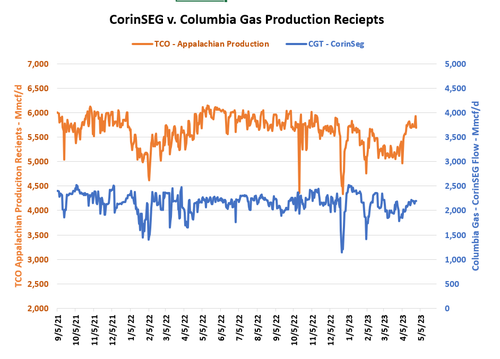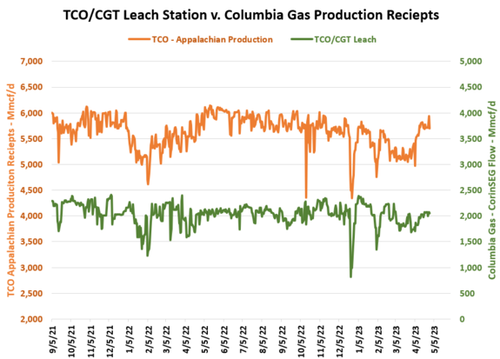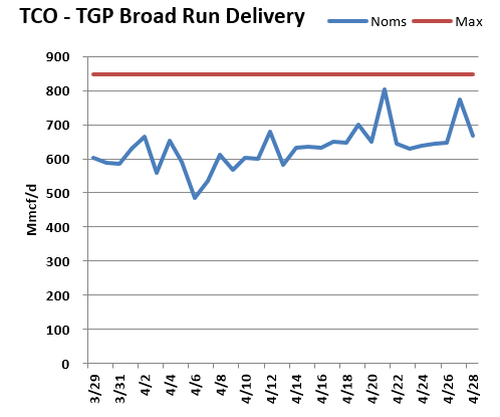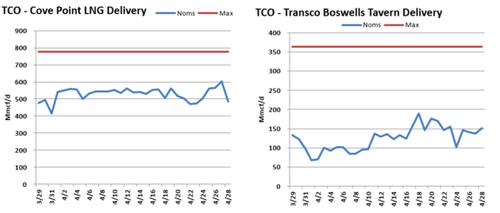Watch: Lightning Hits Columbia Gulf NatGas Compressor In Mississippi
On Friday morning, natural gas futures soared following the news that a lightning strike had caused the shutdown of a Columbia Gulf compressor station in Mississippi.
A video posted on Twitter shows what appears to be a fire at the Corinth Compressor Station in Corinth, Mississippi.
🚨#BREAKING: Lightning has struck the Columbia gulf gas pipeline causing a massive fiery explosion ⁰⁰📌#Corinth | #Mississippi
Currently numerous emergency crews and other agencies have assembled at Columbia Gulf gas pipeline in Corinth, Mississippi in response to massive… pic.twitter.com/WIVfheqz5m
— R A W S A L E R T S (@rawsalerts) April 28, 2023
News of potential disruptions at Corinth Compressor Station sent NatGas futures soaring around 0800 ET from $2.300/MMBtu to $2.50. Prices have since subsided to $2.39.
Houston-based energy firm Criterion Research emailed clients about “the Columbia Gulf force majeure that was declared this morning at the Corinth Compressor Station.”
We wanted to follow up on our prior alert and provide more details and graphics surrounding the Columbia Gulf force majeure that was declared this morning at the Corinth Compressor Station.
The high-level impact will be the loss of 0.4 Bcf/d in Southbound throughput on Columbia Gulf, which in turn will likely correlate to a drop in production receipts on Columbia Gas (TCO) in Appalachia. We will now cover that idea in more detail.
A lightning strike hit the facility this morning in Mississippi, causing a fire onsite and the immediate shutdown of all physical flows to zero. Corinth’s Southbound flows were approximately 2.19 Bcf/d with the early-cycle flows today, and the next cycle will likely see them revised to zero.
However, CGT says they are “in the process of making operational adjustments to allow a portion of volume to resume flowing through the impacted segment of the system.” The early view by CGT is that the adjustments would allow CorinSEG backhaul capacity to be run at a reduced 1,750,000 Dth/d effective ID1 for Gas Day April 28, 2023.
The impact on firm service was estimated at 400,000 Dth/d and it’s important to note that “the capacity setting through CorinSEG is subject to change based on operating conditions at Corinth Compressor Station during the Force Majeure.”
Based on the past seven days of flows into Corinth, the outage will likely push 430 Mmcf/d back into Columbia Gas (TCO) in the Northeastern US.
North of the CorinSEG, CGT receives a lion’s share of its supply from Columbia Gas (TCO) at the Leach meter station, along with limited receipts from TETCO at Adair.
The TCO Leach meter station has been delivering >2 Bcf/d into CGT throughout the second half of April. With Corinth down, we would expect this point to drop in the near term.
Historically, capacity restrictions on CorinSEG have directly correlated with production shut-ins on Columbia Gas, as you can see below.
The same correlation holds between TCO production and the Leach meter station that delivers into Columbia Gulf.
Columbia Gas delivers more than 3 Bcf/d of its daily supply to delivery points spread across Kentucky, West Virginia and Virginia, and the Leach station accounts for a third of that flow. Other notable points where some gas could be diverted include TGP-Broad Run (0.1-0.2 Bcf/d in available capacity), Dominion Cove Point (0.1-0.3 Bcf/d in available capacity) and Transco-Boswells Tavern (0.1-0.2 Bcf/d in available capacity.)
Columbia Gas deliveries into TGP Broad Run tend to run fairly close to max observed rates, but there is some room left to divert gas.
Meanwhile, the more likely paths to move the stranded 430 Mmcf/d would be into the Dominion Cove Point station or Transco’s Boswell Tavern Delivery meter.
*Developing
Tyler Durden
Fri, 04/28/2023 – 13:15
via ZeroHedge News https://ift.tt/cFElI9e Tyler Durden


